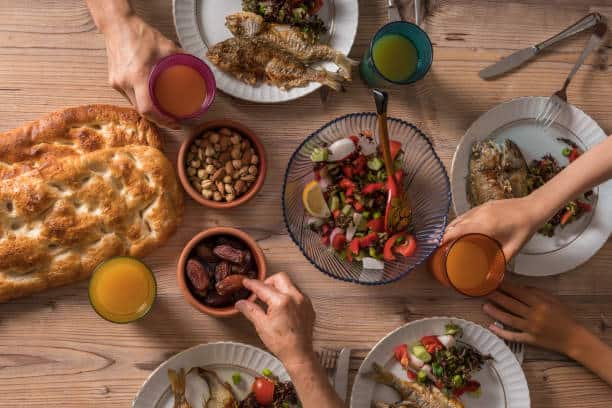LAHORE- Ramadan 2019 is here, and we now find ourselves in the most incredible and blessed month once again; a month filled with reward, blessing, giving to others and, yes, fasting.
Ramadan falls at the peak of summer this year so it is important we maintain our energy levels and avoid the unhealthy food temptations that come with the month.
There’s no need to dive into a food coma after every iftar or hit the bed with a bloated stomach after drinking litres of fluid at sehri – only to feel uncomfortable for the next two hours. And healthy eating in Ramazan doesn’t have to mean boring, bland, unappetizing “diet food” either. It’s perfectly possible to incorporate your favourite Ramazan treats while still eating healthy.
Here are 5 golden rules of healthy eating in Ramazan:
1. Keep yourself hydrated

During the Holy Month of Ramadan, it is necessary to drink plenty of fluids, especially water because of the long period of fasting and high temperatures. Water, juices and soups, as well as vegetables and fruits, are good sources of fluids for the body. Drink as much water or fruit juices as possible between Iftar and bedtime to avoid dehydration. Keep in mind that tea and coffee are dehydrating and shouldn’t be a part of your fluid intake.
2. Say no to sugar

Excess sugar consumption is the root cause of obesity, diabetes and many other health issues. Sugar cravings give you empty calories without nutritional benefits and are key in Ramazan over-eating. Avoid coke, jalebi and chocolate at all costs and replace these with fruits. Bye-bye meetha!
3. Avoid oily, greasy foods

Fried and fatty foods contain a high percentage of fat and sodium intake, so eating them frequently may increase the impact of fatigue and exhaustion. Save fried food for special occasions and bake or grill your food when you can. Grilled kebabs, baked pastries and baked samosas are all delicious and use a lot less oil.
4. Limit unhealthy food to small portions

If you really can’t resist eating parathas and pakoras, limit them to a once-a-week treat rather than a daily indulgence. Avoid over-eating and limit unhealthy food to bite-size portions that you savour rather than platefuls that you gobble down.
5. You Aren’t Eating Enough Probiotic/Prebiotic Foods

For iftar, keep some plain, natural yoghurt on the table; it is great for aiding digestion.
Have more to add to the story? Comment below and stay tuned for updates!













